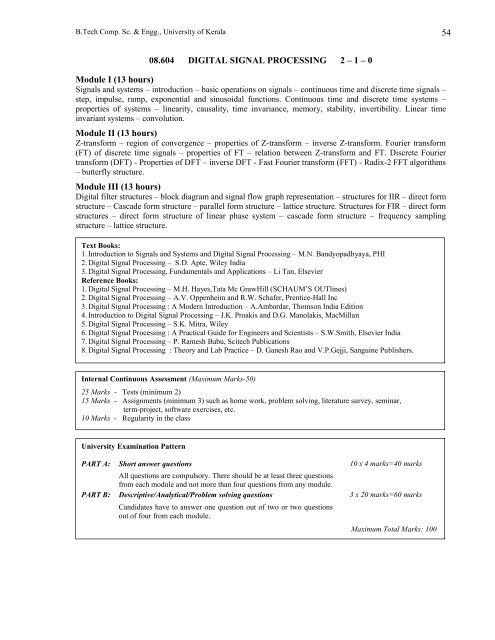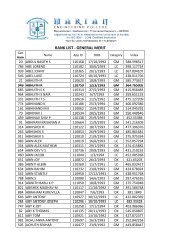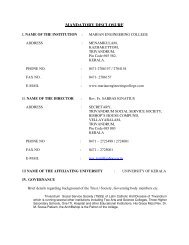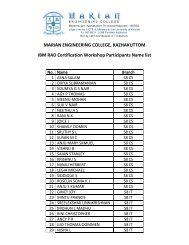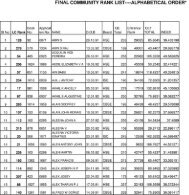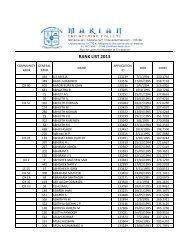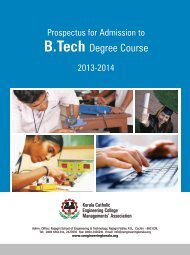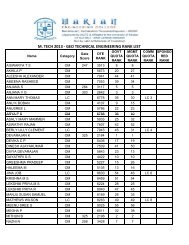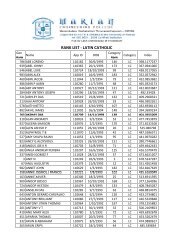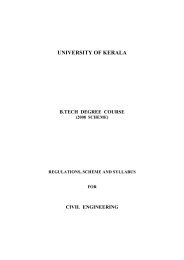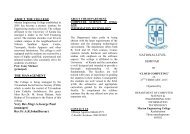UNIVERSITY OF KERALA - Marian Engineering College
UNIVERSITY OF KERALA - Marian Engineering College
UNIVERSITY OF KERALA - Marian Engineering College
Create successful ePaper yourself
Turn your PDF publications into a flip-book with our unique Google optimized e-Paper software.
B.Tech Comp. Sc. & Engg., University of Kerala 54<br />
08.604 DIGITAL SIGNAL PROCESSING 2 – 1 – 0<br />
Module I (13 hours)<br />
Signals and systems – introduction – basic operations on signals – continuous time and discrete time signals –<br />
step, impulse, ramp, exponential and sinusoidal functions. Continuous time and discrete time systems –<br />
properties of systems – linearity, causality, time invariance, memory, stability, invertibility. Linear time<br />
invariant systems – convolution.<br />
Module II (13 hours)<br />
Z-transform – region of convergence – properties of Z-transform – inverse Z-transform. Fourier transform<br />
(FT) of discrete time signals – properties of FT – relation between Z-transform and FT. Discrete Fourier<br />
transform (DFT) - Properties of DFT – inverse DFT - Fast Fourier transform (FFT) - Radix-2 FFT algorithms<br />
– butterfly structure.<br />
Module III (13 hours)<br />
Digital filter structures – block diagram and signal flow graph representation – structures for IIR – direct form<br />
structure – Cascade form structure – parallel form structure – lattice structure. Structures for FIR – direct form<br />
structures – direct form structure of linear phase system – cascade form structure – frequency sampling<br />
structure – lattice structure.<br />
Text Books:<br />
1. Introduction to Signals and Systems and Digital Signal Processing – M.N. Bandyopadhyaya, PHI<br />
2. Digital Signal Processing – S.D. Apte, Wiley India<br />
3. Digital Signal Processing, Fundamentals and Applications – Li Tan, Elsevier<br />
Reference Books:<br />
1. Digital Signal Processing – M.H. Hayes,Tata Mc GrawHill (SCHAUM’S OUTlines)<br />
2. Digital Signal Processing – A.V. Oppenheim and R.W. Schafer, Prentice-Hall Inc<br />
3. Digital Signal Processing : A Modern Introduction – A.Ambardar, Thomson India Edition<br />
4. Introduction to Digital Signal Processing – J.K. Proakis and D.G. Manolakis, MacMillan<br />
5. Digital Signal Processing – S.K. Mitra, Wiley<br />
6. Digital Signal Processing : A Practical Guide for Engineers and Scientists – S.W.Smith, Elsevier India<br />
7. Digital Signal Processing – P. Ramesh Babu, Scitech Publications<br />
8. Digital Signal Processing : Theory and Lab Practice – D. Ganesh Rao and V.P.Gejji, Sanguine Publishers.<br />
Internal Continuous Assessment (Maximum Marks-50)<br />
25 Marks - Tests (minimum 2)<br />
15 Marks - Assignments (minimum 3) such as home work, problem solving, literature survey, seminar,<br />
term-project, software exercises, etc.<br />
10 Marks - Regularity in the class<br />
University Examination Pattern<br />
PART A: Short answer questions 10 x 4 marks=40 marks<br />
All questions are compulsory. There should be at least three questions<br />
from each module and not more than four questions from any module.<br />
PART B: Descriptive/Analytical/Problem solving questions 3 x 20 marks=60 marks<br />
Candidates have to answer one question out of two or two questions<br />
out of four from each module.<br />
Maximum Total Marks: 100


